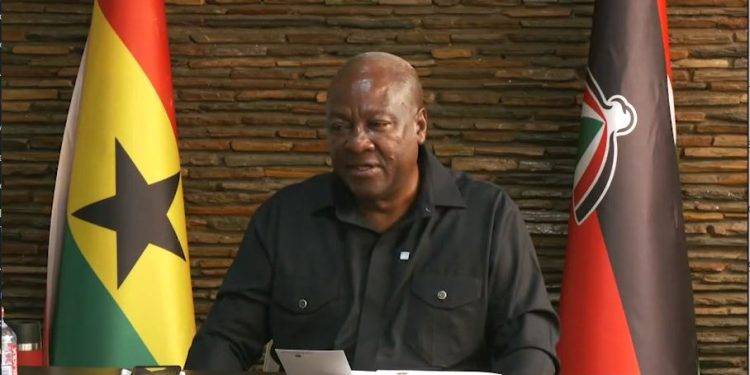President-elect John Dramani Mahama has expressed grave concerns about the state of governance at the Electricity Company of Ghana (ECG), highlighting its unsustainable commercial and technical losses, which have reached over 32%. According to Mahama, these losses are crippling the energy sector and pose a significant threat to the country’s economic stability if left unaddressed.
Speaking at a public engagement, Mahama described the losses as untenable for any utility company, warning that continued inefficiencies at ECG could derail Ghana’s broader economic recovery efforts, including gains made through the debt exchange program and its commitments under the International Monetary Fund (IMF) agreement.
"The energy sector can derail everything we have achieved with regard to the debt exchange and the IMF program because debt continues to pile up there," Mahama remarked. "ECG’s governance is in a very bad way, with commercial and technical losses exceeding 32%. No utility company can survive such losses and remain viable. Urgent reforms across the entire electricity value chain are needed to stabilize the sector."
A Mounting Crisis in Ghana’s Energy Sector
Ghana’s energy sector has long been burdened by inefficiencies, debt accumulation, and governance challenges, but the revelation of ECG’s staggering 32% losses adds a new dimension to the crisis. These losses stem from a combination of technical faults, such as transmission inefficiencies, and commercial challenges, including non-payment of bills and power theft.
Mahama emphasized that if these challenges are not resolved, they will undermine not just the energy sector but the nation’s financial commitments as a whole. He pointed out that ECG’s inability to collect revenue effectively continues to worsen its debt burden, creating ripple effects that threaten the sustainability of Ghana’s energy supply and its economic recovery agenda.
"It’s not just about ECG alone," Mahama noted. "The ripple effects of its inefficiencies extend to other parts of the economy. The debt in the energy sector is mounting, and if we do not act swiftly, it will wipe out the progress we’ve made in stabilizing the economy."
Urgent Call for Reforms
Mahama’s comments have reignited conversations about the need for immediate reforms in the energy sector. Analysts and stakeholders have consistently called for restructuring within ECG, with some suggesting partial privatization or public-private partnerships as potential solutions.
In 2019, Ghana’s Millennium Development Authority (MiDA) launched the Power Compact program, which aimed to address inefficiencies in ECG through private-sector participation. However, the initiative faced significant resistance and was eventually discontinued. Mahama, during his tenure as President, had supported such reform efforts, and his latest remarks suggest a renewed push for bold measures to restore ECG’s viability.
The President-elect stressed the need for a holistic approach to reform, targeting not only ECG’s operational inefficiencies but also addressing systemic governance issues across the electricity sector. He urged policymakers and industry players to prioritize innovative solutions that would reduce losses and enhance service delivery.
The Role of Policy and Accountability
Mahama’s comments have also sparked debates on the role of governance and accountability in the energy sector. Critics argue that successive governments have failed to implement lasting reforms, allowing inefficiencies at ECG to persist unchecked. Some have accused political interference and weak regulatory oversight of exacerbating the challenges facing the company.
Energy experts have underscored the need for ECG to adopt modern technologies to improve revenue collection and reduce technical losses. Smart metering systems, enhanced grid management, and stricter enforcement of bill payment have all been proposed as potential interventions.
"The technology exists to address these challenges, but the will to implement them has been lacking," said one energy analyst. "It’s not just about technology—it’s about leadership and accountability. ECG needs to be run like a business, not as a political tool."
Broader Implications for Ghana’s Economy
The energy sector plays a pivotal role in Ghana’s economic development, providing power to industries, businesses, and households. Persistent inefficiencies at ECG not only strain government finances but also undermine investor confidence and economic growth.
Mahama’s warning comes at a critical time when Ghana is working to rebuild its economy after facing significant financial challenges in recent years. The country’s participation in an IMF-supported program has provided a lifeline for its fiscal management, but experts caution that unresolved issues in the energy sector could jeopardize these efforts.
As Mahama prepares to assume office, all eyes will be on his administration’s ability to deliver on its promise to revamp the energy sector. Stakeholders are hopeful that the President-elect’s track record and commitment to reform will translate into tangible solutions that address ECG’s challenges and secure Ghana’s energy future.
A Test of Leadership
The ECG crisis represents a litmus test for Mahama’s leadership and vision for Ghana’s economic transformation. The stakes are high, not only for the energy sector but also for the broader economy and the livelihoods of millions of Ghanaians who depend on reliable and affordable electricity.
Mahama’s call for urgent reforms has set the stage for what is likely to be a defining issue of his presidency. Whether his administration can deliver the needed changes remains to be seen, but the message is clear: the time for action is now.




No comments yet
Be the first to share your thoughts!